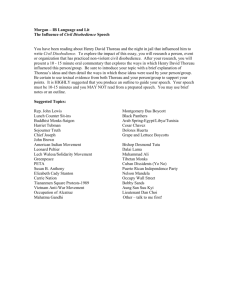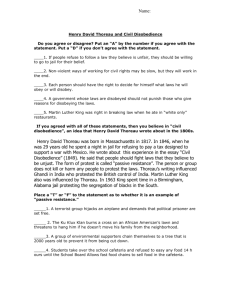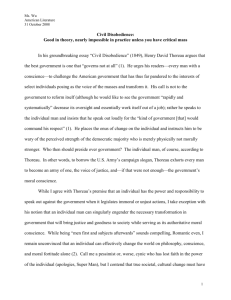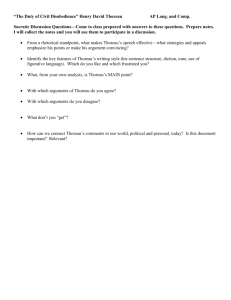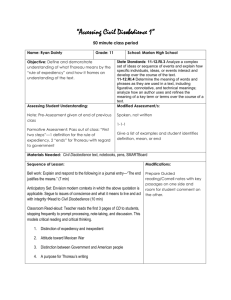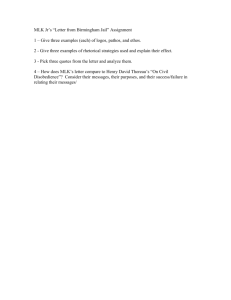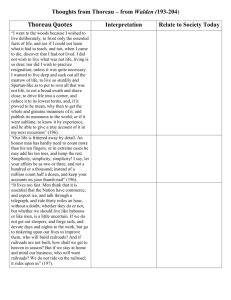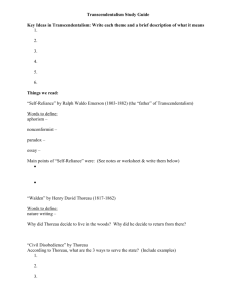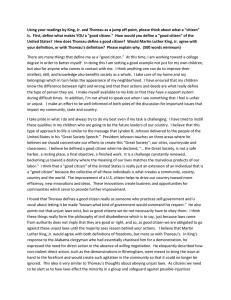“Civil Disobedience”
advertisement
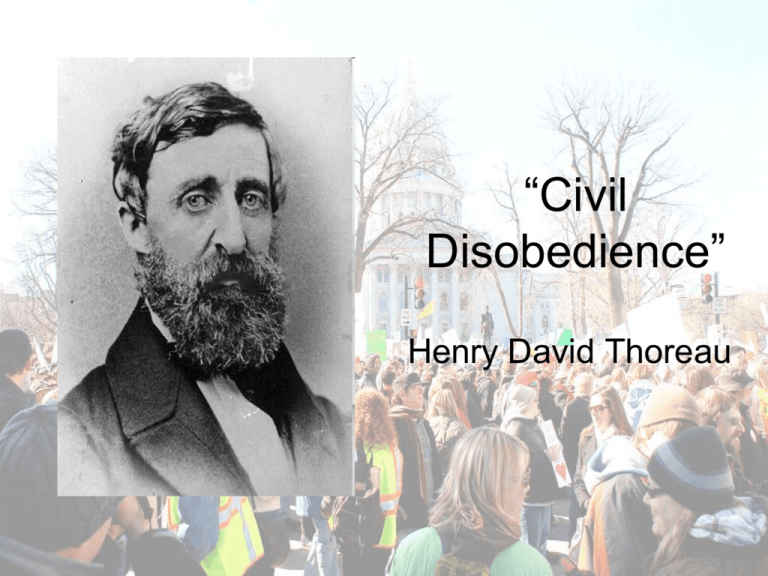
“Civil Disobedience” Henry David Thoreau What does it mean to be a good citizen? • • • • • • Vote in elections? Conform to majority opinion? Participate in protest marches? Obey laws? Other ideas? Always, usually, sometimes, or never? Three ways to serve the state? • P. 372 ¶2 starting with line 65 • With their bodies – Army, militia, etc. – No judgment • Heads – Legislators, politicians – Don’t make moral distinctions • Consciences – Heroes, patriots, reformers – Often resist the state What is your first reaction to Thoreau’s ideas on civil disobedience, or nonviolent resistance? According to Thoreau, what should be respected more than the law? • Conscience – “Must the citizen ever for a moment… resign his conscience to the legislator?” – “The only obligation which I have a right to assume is to do at any time what I think is right.” • Justice – “Law never made men a whit more just” – Example of men who fight in wars they disagree with What should a citizen do about an unjust law? • “If it is of such a nature that it requires you to be the agent of an injustice to another, then, I say, break the law.” • “If one honest man…ceasing to hold slaves, were actually to withdraw from this copartnership…it would be the abolition of slavery in America.” How does Thoreau respond to being jailed? • “Under a government which imprisons any unjustly, the true place for a just man is also a prison.” • “I did not for a moment feel confined” 2. How convincing do you find Thoreau’s argument? • A man must live according to his nature • Circumstances under which he advocates breaking the law • His views on majority rule 3. How important to Thoreau’s argument is his idea about the different ways of serving the state? • Three ways of serving state: – Body, mind, conscience •It’s very important because he points out that great people serve the state with their conscience, and therefore often resist it. 4. What might some find threatening about Thoreau’s ideas? • What if everyone resists everything? • How far is too far with civil disobedience? • Powerful may be afraid of the power of people working together 5. A paradox is a statement that seems to contradict itself but may nevertheless suggest an important truth. • Example: a good citizen must sometimes break the law • That government is best that governs not at all (cont. next slide) 5. (cont) Paradox • Under a government which imprisons any unjustly, the true place for a just man is also a prison. • Those who serve with their conscience often resist the state. • I did not for a moment feel confined, and the walls seemed a great waste of stone and mortar. What connections do you see between Thoreau’s views and Gandhi’s? • Gandhi’s “satyagraha” is similar to Thoreau’s “civil disobedience” – Resist injustice peacefully – Cheerfully accept the consequences • “We will gladly die and will not so much as touch you. But so long as there is yet life in these our bones, we will never comply with your arbitrary laws.” Transcendentalist Literature Analysis Chart Self-reliance/intuition • “The only obligation which I have a right to assume is to do at anytime what I think right.” • “What I have to do is to see, at any rate, that I do not lend myself to the wrong which I condemn” Importance of nature • Nature/earth – “If a plant cannot live according to its nature, it dies; and so a man.” • Human nature – “The only obligation which I have a right to assume is to do at any time what I think right.” Free thought and expression • “Must the citizen ever for a moment, or in the least degree, resign his conscience to the legislator?” • “Why does it not encourage its citizens to be on the alert to point out its faults, and do better than it would have them?” • Refused to pay poll tax due to anti-slavery and anti-war beliefs Importance of individual/nonconformity • “A minority is powerless while it conforms to the majority; it is not even a minority then; but it is irresistible when it clogs by its whole weight.” • “Let your life be a counter-friction to stop the machine.” Confidence • “Let your life be a counter-friction to the machine.” • “A very few – as heroes, patriots, martyrs, reformers in the great sense, and men – serve the state with their consciences also, and so necessarily resist it for the most part; and they are commonly treated as enemies by it….”
